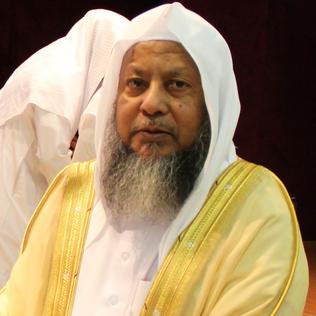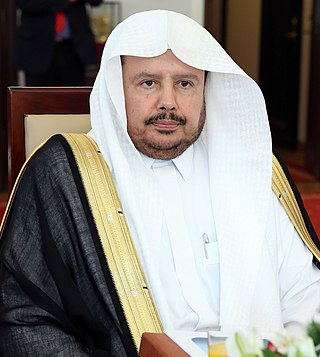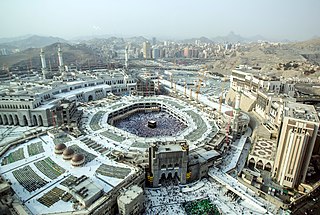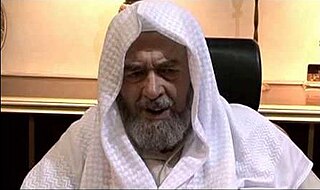Related Research Articles
Abdul-Aziz ibn Abdullah ibn Baz, popularly known as Bin Baz or Ibn Baz, was a Saudi Arabian Islamic scholar who served as the Grand Mufti of Saudi Arabia from 1993 until his death in 1999 (1420AH). According to French political scientist Gilles Kepel, ibn Baz was a "figurehead" whose "immense religious erudition and his reputation for intransigence" gave him prestige among the population of Saudi Arabia. He "could reinforce the Saud family's policies through his influence with the masses of believers". His death left the government without a comparable figure from amongst Salafi scholars to "fill his shoes". He was a leading proponent of the Salafi school of thought.

Saud ibn Ibrahim ibn Muhammad al-Shuraim ; born 19 January 1966) is a Quranic reciter who was one of the prayer leaders and Friday preachers at the Grand Mosque Masjid al-Haram in Makkah. He also holds a Ph.D degree in Sharia at the Umm al-Qura University in Mecca. Shuraim was recently appointed as dean and "Specialist Professor in Fiqh" at the University.
Muhammad ibn Salih al-Uthaymin was a Saudi Islamic scholar.

Abdul Rahman ibn Abdul Aziz al-Sudais, better known as al-Sudais, is the Chief Imam of the Grand Mosque, Masjid al-Haram in Makkah, Saudi Arabia; the President of the General Presidency for the Affairs of the Two Holy Mosques; a renowned Qāriʾ ; he was the Dubai International Holy Qur'an Award's "Islamic Personality Of the Year" in 2005. Al-Sudais has preached Islam's opposition to "explosions and terrorism", and has called for peaceful inter-faith dialogue, but also been criticized for vilifying non-Muslims and especially Jews in his sermons. He has denounced the treatment of Palestinians by Israeli settlers and the state of Israel, and called for more aid to be sent to Palestinians. He has also been noted for identifying women's un-Islamic behavior as in part responsible for the winter 2006 drought in Saudi Arabia. In 2016, he delivered the very important Hajj sermon to a multitude of pilgrims gathered at Arafat after prayers.
The Permanent Committee for Scholarly Research and Ifta is an Islamic organization in Saudi Arabia established by the King that issues rulings in Islamic jurisprudence (fiqh) and prepares research papers for the Council of Senior Scholars, which advises the king on religious matters. Its members are drawn from the Council of Senior Scholars, of which it is a committee, and consist of the most senior Sunni scholars of fiqh in Saudi Arabia, including the Grand Mufti of Saudi Arabia as its head. The issuance of fataawa in Saudi Arabia is limited to members of the Council of Senior Scholars and a few other clerics.

International Islamic Fiqh Academy is an international Islamic institution for the advanced study of Islamic jurisprudence and law based in Jeddah, Saudi Arabia. It was founded following a resolution by the Third Islamic Summit Conference of the Organization of Islamic Cooperation, held in Mecca, that called for the establishment of an Islamic Fiqh Academy. The International Islamic Fiqh Academy was established in June 1983 as a subsidiary organ of the Organization of Islamic Cooperation. It consists of 57 member states and representatives.
Ṣāliḥ ibn ʻAbd Allāh ibn Ḥumayd, is a Saudi Arabian Imam and politician. He is currently one of the nine Imams of Grand Mosque of Mecca. He is also member of Assembly of Saudi Arabia since 1993 and had served Speaker of Majlis al Shura from February 2002 to February 2009.

Ali Ahmed Mullah, is the veteran muazzin at the Masjid al-Haram in Mecca, Saudi Arabia for the past three decades. Ali Ahmed Mulla is the longest serving muazzin for the Masjid al-Haram and has been following his family tradition in this profession since 1975.

Muhammad Ayyub ibn Muhammad Yusuf ibn Sulaiman `Umar was a Saudi Arabian Imam, Qari, and Islamic scholar known for his recitation of the Quran. He was an Imam of Al-Masjid an-Nabawi in Medina, Saudi Arabia. He was also a faculty member of the Department of Tafsir in the Faculty of the Holy Qur'an and Islamic Studies at the Islamic University of Madinah and a member of the Scholarly Committee of the King Fahd Complex for the Printing of the Holy Quran. His death occurred on 16 April 2016.
Islam is an Abrahamic monotheistic religion teaching that there is only one God (Allah) and that Muhammad is His last Messenger.

Abdullah ibn Muhammad Al ash-Sheikh is the chairman of the Majlis ash-Shura of Saudi Arabia since February 2009. He was the minister of Justice from February 1992 to February 2009.
Saʻad al-Ghāmidī is a Qāriʾ and a former imam of the great holy mosque Masjid an-Nabawi. Shaykh Sa'ad al-Ghamdi has served as imam to Muslim communities across the globe.

Masjid al-Haram, also known as the Sacred Mosque or the Great Mosque of Mecca, is considered to be the most significant mosque in Islam. It encloses the vicinity of the Kaaba in Mecca, in the Mecca Province of Saudi Arabia. It is among the pilgrimage sites associated with the Hajj, which every Muslim must perform at least once in their lives if able. It is also the main site for the performance of ʿUmrah, the lesser pilgrimage that can be undertaken any time of the year. The rites of both pilgrimages include circumambulating the Kaaba within the mosque. The Great Mosque includes other important significant sites, such as the Black Stone, the Zamzam Well, Maqam Ibrahim, and the hills of Safa and Marwa.

Subhi bin Jassim bin Humaid al-Badri al-Samarrai (1936–2013) was a leading Iraqi muhaddith and one of the founders of Salafi movement in Iraq.
Abdullah ibn Abdur-Rahman al-Ghudayyan was a Saudi Arabian Islamic scholar, a leading proponent of the Salafi form of Islam and a member of the Saudi Council of Senior Scholars. His ancestry was of the tribe of Banu Anbar.

Sheikh Abdul Rahman bin Nasser Al-Saadi, also known as al-Siʿdī (1889–1957), was an Islamic Scholar from Saudi Arabia. He was a teacher and an author in Unaizah, Saudi Arabia. He authored more than 40 books in several different fields including tafsir, fiqh, and 'aqidah. al-Sa'di was an influential figure in the field of tafsir and his book of tafsir entitled Taysir al-Kareem al-Rahman has been described as arguably one of the most popular tafsirs written by modern salafi scholars. He served as the imam and khateeb for the largest jami' mosque and director of the religious training school, al-Ma'had al-'Ilmi, of Unayzah.

Maher bin Hamad bin Muhammad Bin al-Mu'aiqly al-Balawi is an Imam and preacher of the Grand Mosque of Mecca, Masjid al-Haram.
Khalil bin Abd al-Rahman al-Qari, was the Sheikh of the Imams of the Two Holy Mosques, and is considered one of the founders of the modern Qur’anic renaissance.

Yasser ibn Rashed al-Dosari born on 6 August 1980, is an imam, khatib, and qāriʾ from Saudi Arabia. He has been one of the imams of Masjid al-Haram since 12 October 2019. Previously, he is an imam of Taraweeh and Tahajjud at Masjid al-Haram from 2015 and also an imam at several mosques in Riyadh since 1995. Al-Dosari was a student of a group of 'ulama and sheikhs, including Abdulaziz Al Sheikh, Saleh Al-Fawzan, and Abdullah ibn Jibreen. He also learned qira'at with several shuyukh and qaris, including Bakri Al-Tarabisyi and Ibrahim Al-Akhdar. previously his contract had expired and he did not lead for about 5 and a half months. Now he has been reappointed as an Imam of Masjid al-Haram.

Libraries in Saudi Arabia have always been a critical component of Saudi culture and society. They have been prevalent in various forms in palaces, mosques, and schools for over a century and a half. Although older libraries differ from their modern counterparts, they played a pivotal role in facilitating cultural and intellectual movements and benefitting scholarships and scholars more broadly.
References
- ↑ "الشيخ محمد عبد الله السبيل". Archived from the original on 2019-05-25.
- ↑ Abdur Rahman Madani. "الجامعہ الاثریہ، جہلم". Muhaddith (260). Lahore: Majlis Teqheeq-e-Islami: 42.
- ↑ "وفاة إمام الحرم المكي الشيخ محمد السبيل" [The death of the imam of the Grand Mosque in Mecca, Sheikh Muhammad Al-Sabil]. Archived from the original on 2019-12-13.
